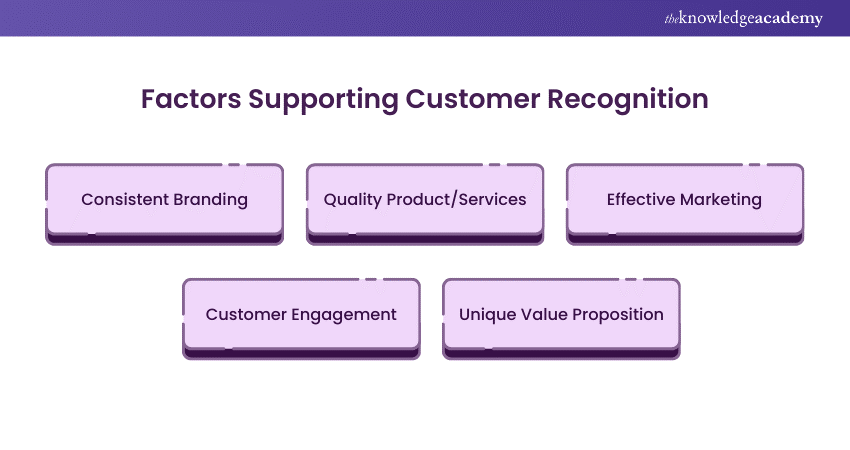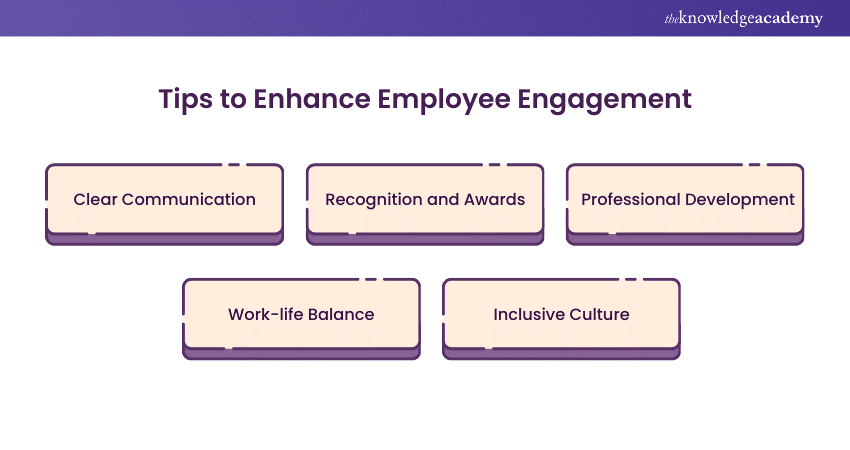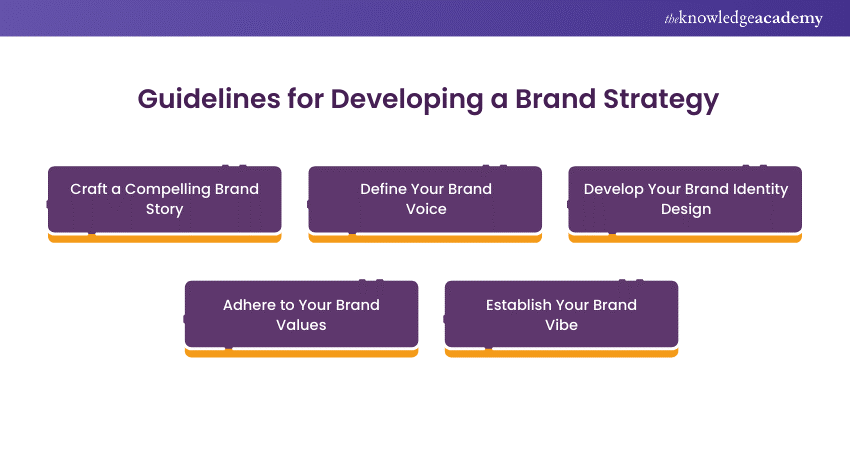We may not have the course you’re looking for. If you enquire or give us a call on 0800 446148 and speak to our training experts, we may still be able to help with your training requirements.
Training Outcomes Within Your Budget!
We ensure quality, budget-alignment, and timely delivery by our expert instructors.

Think about a time when you're walking into a store and instantly recognising a product by its logo, colours, and overall vibe. This connection is the result of a well-executed Brand Strategy. But what exactly makes it effective? How can businesses create a brand that not only stands out but also builds lasting relationships with customers? In this blog, we will explore the key steps to building this powerful strategy.
From crafting a compelling brand story to defining your brand voice, each step plays a crucial role in shaping a brand that resonates with its audience. Let’s dive into the essential steps of Brand Strategy and discover how to make your brand flourish.
Table of Contents
1) What is Brand Strategy?
2) The Importance of Strategic Brand
3) Key Elements of a Brand Strategy
4) Essential Steps to Build a Brand Strategy
5) Conclusion
What is Brand Strategy?
A Brand Strategy is a comprehensive approach that a brand uses to establish identification and favourability with both existing and potential customers. It includes various brand elements such as voice, storytelling, brand identity, brand values, and overall vibe. If your brand represents how you present your business to the world, then that framework supports it.
A Brand Strategy serves as a guide for founders, their teams, and anyone representing the business. It provides answers on how a brand should behave in different situations.
The Importance of Strategic Brand
Strategic branding is crucial for businesses of all sizes and industries. Here are some key reasons why strategic branding is important:
1) Differentiation
In a crowded marketplace, a strong brand helps you stand out. Strategic branding highlights what makes your business unique, whether it’s your values, mission, products, or services. This differentiation is essential for attracting and retaining customers who align with your brand’s identity.
2) Customer Recognition
A well-defined brand makes it easier for customers to recognise and remember your business. Consistent use of logos, colours, and messaging across all touchpoints creates a memorable brand image.

This recognition can lead to increased customer loyalty and repeat business. Additionally, it can enhance word-of-mouth referrals as satisfied customers are more likely to recommend your brand to others.
3) Trust and Credibility
A strong brand provides a level of credibility that is important to your target audiences. If potential customers see a well-kept and professionally managed business image, they will buy from your firm. Purchasing decisions involve the aspect or factor of trust; hence it is evident that a credible brand can impact a customer’s behaviour.
4) Emotional Connection
Strategic branding helps create an emotional connection with your audience. By conveying your brand’s values and personality, you can resonate with customers on a deeper level. Emotional connections foster loyalty and can turn customers into brand advocates who promote your business through word-of-mouth.
5) Competitive Advantage
A well-crafted Brand Strategy gives you a competitive edge. It allows you to position your brand uniquely in the market, making it harder for competitors to replicate your success. A strong brand can also command premium pricing, as customers are often willing to pay more for brands they trust and value.
6) Business Growth
Strategic branding supports business growth by attracting new customers and retaining existing ones. A strong brand can open doors to new markets and opportunities, as it is often easier to expand a well-recognised and respected brand. Additionally, a cohesive Brand Strategy can streamline marketing efforts, making them more effective and efficient.
Stay ahead of the competition by signing up for our Digital Marketing Courses - join us now!
7) Employee Engagement
A clear and compelling Brand Strategy can also engage and motivate employees. When employees understand and believe in the brand’s mission and values, they are more likely to be passionate and committed to their work.

Engaged employees can deliver better customer experiences, further strengthening the brand.
8) Long-term Success
Investing in strategic branding is an investment in the long-term success of your business. A strong brand can withstand market fluctuations and changes in consumer behaviour. It provides a solid foundation for building customer loyalty, driving sales, and achieving sustainable growth.
Key Elements of a Brand Strategy
A well-defined Brand Strategy is essential for building a strong and recognisable brand that resonates with your target audience. Here are the fundamental components of a successful Brand Strategy:
1) Purpose
Brand purpose answers the question, “Why does my brand exist?” By defining your customer, mission statement, and values, your brand purpose becomes clear. It serves as a motivating principle for founders, helping them navigate challenges.
2) Consistency
A robust Brand Strategy ensures that anyone representing your brand uses the correct language and visual elements, maintaining consistency across all channels and touchpoints. Consistency in messaging, tone, and adherence to values is crucial at every stage of building your Brand Strategy.
3) Emotion
Emotional branding aims to create a bond between the brand and its customers by appealing to their emotions. This can be achieved through storytelling, impactful visuals, and customer experiences that evoke feelings of happiness, trust, or nostalgia. Emotional connections can turn customers into loyal advocates.
4) Flexibility
While consistency is crucial, brands also need to be flexible to stay relevant in a constantly changing market. Flexibility allows a brand to adapt its strategies, messages, and visuals to meet new trends, customer preferences, and market conditions without losing its core identity.
Register for our Social Media Marketing Course and master the strategies to grow your online presence!
5) Employee Engagement
Employees are the brand’s ambassadors. Engaging employees in the Brand Strategy ensures they understand and embody the brand’s values and mission. When employees are passionate about the brand, they can deliver authentic and positive experiences to customers, strengthening the brand’s reputation.
6) Loyalty
Building customer loyalty is essential for long-term success. Loyalty sessions, exceptional customer service, and consistent value delivery can help retain customers and encourage repeat business. Loyal customers are more likely to recommend the brand to others, driving growth through word-of-mouth.
7) Competitive Awareness
Understanding the competitive landscape is vital for differentiating the brand. Competitive awareness involves analysing competitors’ strengths and weaknesses, identifying market opportunities, and positioning the brand uniquely. This helps to create a distinct brand identity that stands out in the market.
Essential Steps to Build a Brand Strategy
Building a Brand Strategy involves a series of deliberate steps that help define and communicate your brand’s identity, values, and purpose. Here are the essential steps to build a successful Brand Strategy:

1) Craft a Compelling Brand Story
Your brand story is the narrative that communicates the key moments in your business’s origin, core beliefs, values, and purpose. A well-crafted brand story fosters a deeper connection between your business and its customers.
By sharing why your business exists, what it stands for, and what inspired its inception and continued journey, you create an inviting atmosphere where people can understand your business on a more personal level.
2) Define Your Brand Voice
Your brand voice comprises the words and phrases used to communicate with current and potential customers across various marketing channels and your website. A distinctive brand voice might evoke the familiarity of a sarcastic friend, the warmth of a kind teacher, or the reassurance of a trusted doctor. It sets the tone for customer relationships and indicates what they can expect from your brand.
Without a well-defined, personality-rich voice, a brand risks losing its connection with its audience or conveying an unintended message. An internal style guide ensures consistency across all communications.
3) Develop Your Brand Identity Design
Your brand identity design encompasses all the visual elements that represent your brand, including your logo, colour palette, typography, and imagery. These elements should be cohesive and reflect your brand’s personality and values. A strong brand identity design helps create a memorable and recognisable brand image.
Consistency in your brand identity design across all touchpoints, such as your website, social media, packaging, and marketing materials, reinforces your brand’s presence and makes it easier for customers to identify and connect with your brand. Investing in professional design can significantly enhance your brand’s credibility and appeal.
4) Adhere to Your Brand Values
Your brand values are the guiding principles that shape your business’s actions and decisions. Clearly defining and adhering to these values ensures that your brand remains authentic and trustworthy. Customers are more likely to support brands that align with their own values and demonstrate integrity.
Communicating your brand values consistently through your marketing efforts, customer interactions, and business practices helps build a strong, loyal customer base. It also sets your brand apart from competitors who may not prioritise the same values, giving you a competitive edge.
5) Establish Your Brand Vibe
Your brand vibe is the overall feeling or atmosphere that your brand conveys. It encompasses the emotional and sensory experiences that customers associate with your brand. Establishing a distinct brand vibe helps create a cohesive and immersive brand experience that resonates with your audience.
Consider how your brand’s visual identity, tone of voice, and customer interactions contribute to the overall vibe. Whether your brand is playful, sophisticated, adventurous, or comforting, maintaining a consistent vibe across all touchpoints helps strengthen your brand’s identity and fosters a deeper connection with your customers.
Conclusion
Building a powerful brand requires a thoughtful strategy and consistent effort. By crafting a compelling brand story, and adhering to your core values, you can create a brand that resonates deeply with your audience. A strong Brand Strategy not only stands out in the market but also builds lasting customer connections.
Learn how to leverage your online presence to drive real results - register for our Influencer Marketing Course today!
Frequently Asked Questions

A Brand Strategy should include a clear brand purpose, target audience, unique value proposition, brand messaging, visual identity, and a plan for brand communication. It must align with business objectives and consider market positioning, and competitive analysis.

The dimensions of branding strategy include brand identity, brand positioning, brand equity, brand communication, and brand experience. These dimensions collectively shape how a brand is perceived, ensuring consistency across all touchpoints and fostering a strong connection with the target audience.

The Knowledge Academy takes global learning to new heights, offering over 30,000 online courses across 490+ locations in 220 countries. This expansive reach ensures accessibility and convenience for learners worldwide.
Alongside our diverse Online Course Catalogue, encompassing 19 major categories, we go the extra mile by providing a plethora of free educational Online Resources like News updates, Blogs, videos, webinars, and interview questions. Tailoring learning experiences further, professionals can maximise value with customisable Course Bundles of TKA.

The Knowledge Academy’s Knowledge Pass, a prepaid voucher, adds another layer of flexibility, allowing course bookings over a 12-month period. Join us on a journey where education knows no bounds.

The Knowledge Academy offers various Digital Marketing Courses, including the Business Branding Course, Social Media Marketing Course, and Influencer Marketing Course. These courses cater to different skill levels, providing comprehensive insights into Key Value Proposition of Google Search Campaigns.
Our Digital Marketing Blogs cover a range of topics related to Branding Strategy, offering valuable resources, best practices, and industry insights. Whether you are a beginner or looking to advance your Digital Marketing skills, The Knowledge Academy's diverse courses and informative blogs have got you covered .
Upcoming Digital Marketing Resources Batches & Dates
Date
 Business Branding Course
Business Branding Course
Fri 28th Mar 2025
Fri 23rd May 2025
Fri 4th Jul 2025
Fri 5th Sep 2025
Fri 24th Oct 2025







 Top Rated Course
Top Rated Course



 If you wish to make any changes to your course, please
If you wish to make any changes to your course, please


